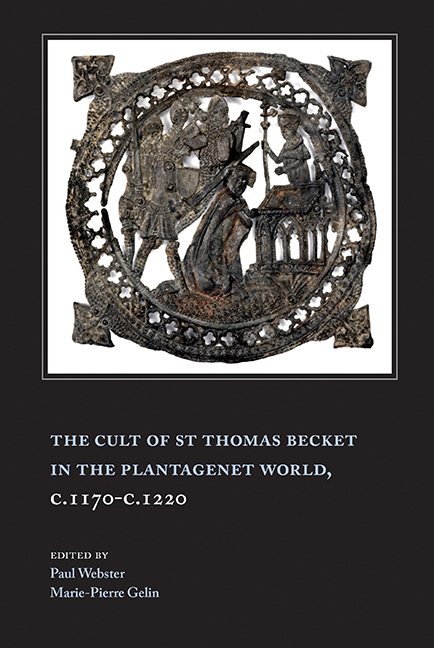Book contents
- Frontmatter
- Contents
- List of Illustrations
- List of Contributors
- Preface
- Acknowledgements
- List of Abbreviations
- 1 Introduction. The Cult of St Thomas Becket: An Historiographical Pilgrimage
- 2 Becket is Dead! Long Live St Thomas
- 3 The Cult of St Thomas in the Liturgy and Iconography of Christ Church, Canterbury
- 4 Thomas Becket and Leprosy in Normandy
- 5 Thomas Becket in the Chronicles
- 6 Matilda, Duchess of Saxony (1168–89) and the Cult of Thomas Becket: A Legacy of Appropriation
- 7 Leonor Plantagenet and the Cult of Thomas Becket in Castile
- 8 Crown Versus Church After Becket: King John, St Thomas and the Interdict
- 9 The St Thomas Becket Windows at Angers and Coutances: Devotion, Subversion and the Scottish Connection
- Bibliography
- Index
5 - Thomas Becket in the Chronicles
Published online by Cambridge University Press: 25 October 2017
- Frontmatter
- Contents
- List of Illustrations
- List of Contributors
- Preface
- Acknowledgements
- List of Abbreviations
- 1 Introduction. The Cult of St Thomas Becket: An Historiographical Pilgrimage
- 2 Becket is Dead! Long Live St Thomas
- 3 The Cult of St Thomas in the Liturgy and Iconography of Christ Church, Canterbury
- 4 Thomas Becket and Leprosy in Normandy
- 5 Thomas Becket in the Chronicles
- 6 Matilda, Duchess of Saxony (1168–89) and the Cult of Thomas Becket: A Legacy of Appropriation
- 7 Leonor Plantagenet and the Cult of Thomas Becket in Castile
- 8 Crown Versus Church After Becket: King John, St Thomas and the Interdict
- 9 The St Thomas Becket Windows at Angers and Coutances: Devotion, Subversion and the Scottish Connection
- Bibliography
- Index
Summary
When he came to the year of Thomas Becket's death, the Limoges chronicler Geoffrey of Vigeois decided that he would pass over it, explaining that since so many people had written about the archbishop's life and death, there was no point in his covering the same material again. Geoffrey's editorial decision is understandable. Although he wrote his chronicle little more than a decade after Thomas's murder in December 1170, he was evidently aware of the recent explosion of literary interest in the subject. By 1180, lengthy Lives of St Thomas had been written by Edward Grim, William of Canterbury, John of Salisbury, William Fitz Stephen, Guernes de Pont-Sainte-Maxence and two anonymous authors, in addition to shorter works by John of Salisbury, Alan of Tewkesbury and Benedict of Peterborough. Benedict had composed his collection of the saint's miracles, and William of Canterbury had published most of his, while Alan of Tewkesbury had completed the great task begun by John of Salisbury of putting together Thomas's collection of correspondence. One could be forgiven for thinking that all that needed to be said had been said. But then and now, people have always found more to say about Thomas's life and death, and new angles from which to view it. The half-century after Becket's murder was a very productive period of historical writing, especially in England and especially in histories of recent events, and few of those who wrote about their own times could resist touching on the subject of the martyred archbishop. Here I shall look at how Thomas Becket featured in historical writing at the end of the twelfth and the beginning of the thirteenth centuries, using the term ‘chronicles’ in the widest possible sense to distinguish them from the Lives. My concern is not so much to examine what they add to our knowledge about Thomas's life and death, but how they related his legacy to their own concerns in the decades after his murder.
The cult of Thomas Becket had a remarkable geographical reach, and his murder also won the attention of chroniclers far and wide.
- Type
- Chapter
- Information
- Publisher: Boydell & BrewerPrint publication year: 2016



